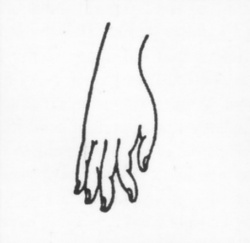Difference between revisions of "Bhumisparsha (Earth Witness) Mudra"
| Line 1: | Line 1: | ||
[[File:BhumisparshaMudra.JPG|thumb|250px|]] | [[File:BhumisparshaMudra.JPG|thumb|250px|]] | ||
| − | Bhumisparsha means 'touching the earth'. It is more commonly known as the 'earth witness' mudra. This mudra, formed with all five fingers of the right hand extended to touch the ground, symbolizes the Buddha's enlightenment under the [[bodhi tree]], when he summoned the earth goddess, Sthavara, to bear witness to his attainment of enlightenment. | + | [[Bhumisparsha]] means '[[touching]] the [[earth]]'. It is more commonly known as the '[[earth witness]]' [[mudra]]. This [[mudra]], formed with all five fingers of the right hand extended to {{Wiki|touch}} the ground, [[symbolizes]] the [[Buddha's]] [[enlightenment]] under the [[bodhi tree]], when he summoned the [[earth]] [[goddess]], [[Sthavara]], to bear {{Wiki|witness}} to his [[attainment]] of [[enlightenment]]. |
| − | The | + | The [[Bhumisparsha-mudra]], or ‘[[touching]] the [[earth]],’ is another gesture that was, according to various {{Wiki|legends}}, made by [[Shakyamuni]] at the moment of his [[Enlightenment]]. “The most popular account tells of his {{Wiki|temptation}} by [[Mara]], the [[Buddhist]] Satan and enemy of [[Enlightenment]], while he sat under the [[bodhi tree]]. [[Shakyamuni]] touched the ground to invoke the [[Earth spirit]] who answered in a {{Wiki|voice}} of {{Wiki|thunder}} confirming the [[righteousness]] of his [[Buddhahood]]” |
| − | The second Dhyani Buddha, [[Akshobhya]], is depicted in this mudra. He is believed to transform the delusion of anger into mirror-like wisdom. It is this metamorphosis that the Bhumisparsha mudra helps in bringing about. | + | The right hand, placed upon the right knee in [[earth-pressing mudra]], and complemented by the left hand-which is held flat in the lap in the [[dhyana mudra]] of [[meditation]], [[symbolizes]] the union of method and [[wisdom]], [[samsara]] and [[nirvana]], and also the realizations of the [[Wikipedia:Convention (norm)|conventional]] and [[Wikipedia:Absolute (philosophy)|ultimate]] [[truths]]. It is in this [[posture]] that [[Shakyamuni]] overcame the obstructions of [[Mara]] while [[meditating]] on [[Truth]]. |
| + | |||
| + | The second [[Dhyani Buddha]], [[Akshobhya]], is depicted in this [[mudra]]. He is believed to [[transform]] the [[delusion]] of [[anger]] into [[mirror-like wisdom]]. It is this metamorphosis that the [[Bhumisparsha mudra]] helps in bringing about. | ||
{{R}} | {{R}} | ||
Revision as of 09:45, 17 December 2013
Bhumisparsha means 'touching the earth'. It is more commonly known as the 'earth witness' mudra. This mudra, formed with all five fingers of the right hand extended to touch the ground, symbolizes the Buddha's enlightenment under the bodhi tree, when he summoned the earth goddess, Sthavara, to bear witness to his attainment of enlightenment.
The Bhumisparsha-mudra, or ‘touching the earth,’ is another gesture that was, according to various legends, made by Shakyamuni at the moment of his Enlightenment. “The most popular account tells of his temptation by Mara, the Buddhist Satan and enemy of Enlightenment, while he sat under the bodhi tree. Shakyamuni touched the ground to invoke the Earth spirit who answered in a voice of thunder confirming the righteousness of his Buddhahood”
The right hand, placed upon the right knee in earth-pressing mudra, and complemented by the left hand-which is held flat in the lap in the dhyana mudra of meditation, symbolizes the union of method and wisdom, samsara and nirvana, and also the realizations of the conventional and ultimate truths. It is in this posture that Shakyamuni overcame the obstructions of Mara while meditating on Truth.
The second Dhyani Buddha, Akshobhya, is depicted in this mudra. He is believed to transform the delusion of anger into mirror-like wisdom. It is this metamorphosis that the Bhumisparsha mudra helps in bringing about.
